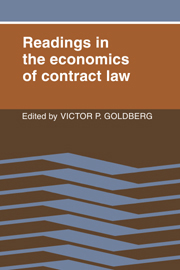Book contents
- Frontmatter
- Contents
- Preface
- Readings in the economics of contract law
- Part I Some preliminaries
- Part II Contract law and the least cost avoider
- 2.1 Unity in tort, contract, and property: the model of precaution
- 2.2 The mitigation principle: toward a general theory of contractual obligation (1)
- 2.3 Relational exchange, contract law, and the Boomer problem (1)
- Questions and notes on the least cost avoider
- Part III The expectation interest, the reliance interest, and consequential damages
- Part IV The lost-volume seller puzzle
- Part V Specific performance and the cost of completion
- Part VI Power, governance, and the penalty clause puzzle
- Part VII Standard forms and warranties
- Part VIII Duress, preexisting duty, and good faith modification
- Part IX Impossibility, related doctrines, and price adjustment
- Questions and notes on impossibility and price adjustment
- References
- Index of cases
- Author index
- Subject index
2.3 - Relational exchange, contract law, and the Boomer problem (1)
Published online by Cambridge University Press: 10 November 2010
- Frontmatter
- Contents
- Preface
- Readings in the economics of contract law
- Part I Some preliminaries
- Part II Contract law and the least cost avoider
- 2.1 Unity in tort, contract, and property: the model of precaution
- 2.2 The mitigation principle: toward a general theory of contractual obligation (1)
- 2.3 Relational exchange, contract law, and the Boomer problem (1)
- Questions and notes on the least cost avoider
- Part III The expectation interest, the reliance interest, and consequential damages
- Part IV The lost-volume seller puzzle
- Part V Specific performance and the cost of completion
- Part VI Power, governance, and the penalty clause puzzle
- Part VII Standard forms and warranties
- Part VIII Duress, preexisting duty, and good faith modification
- Part IX Impossibility, related doctrines, and price adjustment
- Questions and notes on impossibility and price adjustment
- References
- Index of cases
- Author index
- Subject index
Summary
Many aspects of relational contract law can be illuminated by examination of a well-known case from outside the realm of contract law: Boomer v. Atlantic Cement. The facts of Boomer are simple. Atlantic Cement built a large cement plant which produced some pollutants creating a nuisance for some neighboring residents and businesses. The victims sought an injunction to prevent the nuisance. However, the court took into account that the magnitude of damages to the victims was only about $183,000 while if the victims received an injunction, they could conceivably force the cement plant, valued at over $40 million, to shut down.
Shutting down the plant would entail a great social cost and this could be avoided by denying the injunction. Of course, it is highly unlikely that the plant would be closed down even if the injunction were granted. For, if the plant were to close, the victims would receive only a modest benefit: the clean air that removing the nuisance would provide. The clean air might well be worth more to Boomer and friends than the $183,000 price tag assigned it by the court. Nevertheless, the victims could almost certainly do much better if they bargained with Atlantic, selling it the right to continue in business with the same level of pollution. If the plant has no other uses and little scrap value, the victims could conceivably obtain something close to the $40 million that the plant was valued at. The magnitude of the payment would de end upon the bargaining skill and the amount of resources devoted to the bargaining by the two sides.
- Type
- Chapter
- Information
- Readings in the Economics of Contract Law , pp. 69 - 71Publisher: Cambridge University PressPrint publication year: 1982
- 1
- Cited by



